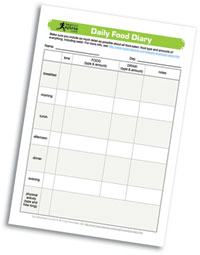A food diary is a very effective tool for weight and diet management as it keeps you honest and tracks everything that you are eating and drinking. To complete a food diary, you record all the food and beverages consumed over a set time period. Commonly three consecutive days (two weekdays and one weekend day) is used. The consumed items can be measured using a scale or other household items, such as measuring cups or spoons, or estimated using a portion-size guide (see instructions for completing a food diary). Following collection, the completed records need to be entered into a software program for analysis. Go here to download one of our free Food Diaries.
Uses of a Food Diary
- You can use it to help determine the volume and composition of your current eating habits, to make sure you are getting adequate amounts of all essential and non-essential elements.
- Writing down your daily food intake enables you to see more easily areas in the diet which need attention. It will force you to think consciously about what you are consuming, and keeps you focused on your goals.
- A health professional or dietitian can use information from an accurately recorded food diary to determine underlying problems and give professional dietary advice and recommendations.

Related Pages
- Download one of our free Food Diaries.
- Benefits of keeping a food diary for weight loss
- See about having your food diary analyzed.
- Instructions for completing a food diary.
- Free Training Diary
- List and Discussion of Dietary Assessment Methods, including a food diary
- More nutrition downloads


 Upcoming Events
Upcoming Events